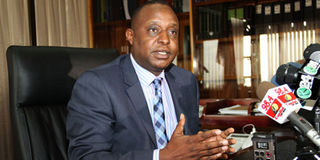The only thing preventing us from being a middle income country is misuse of funds

Treasury Cabinet Secretary Henry Rotich. Kenya is set to be classified as a middle-income country, 16 years ahead of schedule, with the release of revised figures for the economy. FILE PHOTO |
What you need to know:
Accountability can be understood as the assumption of responsibility by public office holders for actions, decisions, omissions and policies within their purview.
Those in government or public service have an obligation to report, explain and be answerable for the consequences of decisions they make on behalf of citizens.
Incidents of bribery, inefficient courts and offices have drastically reduced.
This year has been one of mixed fortunes. Being an election year, a heightened political atmosphere negatively impacted commerce partly due to political uncertainty and the protests that rocked Nairobi, Mombasa, Kisumu, Homa-Bay, Migori, Siaya and Bungoma.
The courts played an important role in the discourse of 2017. Most of the cases decided had to do with laws relating to free speech such as the decriminalisation of defamation and Section 132 that created the offence of “undermining authority of public officer” in February and April 2017 respectively.
Additionally, cases on public access to information held by IEBC and the Presidential Delivery Unit; the tendering processes around ballot printing; the validity of August 8 elections culminating in nullification of the results; cases on whether a fresh election meant an entirely fresh process including nomination; who could run in the fresh election; and, the determination of the election petition filed after the re-run.
DEMOCRACY
Judicial oversight, interpretation and determination plays a vital role in any democracy. Kenyans might take it for granted, but the fact that we remain stable as a nation after all the intricacies surrounding elections in 2017 speaks volumes about our country and the state of our democracy.
The Judiciary as an arm of government has strived to meet the expectations of the constitution. It remains one of the most trusted manifestations of government to date. Incidents of bribery, inefficient courts and offices have drastically reduced. Can the same be said about the legislature, the executive, county governments and constitutional commissions?
If the answer is no, it is probably because we have not figured out the concept of “accountability”. Under Article 10 of the constitution, accountability is mentioned alongside good governance, integrity and transparency as part of our national values.
ACCOUNTABILITY
Accountability can be understood as the assumption of responsibility by public office holders for actions, decisions, omissions and policies within their purview. It is a fundamental requirement of good governance. Those in government or public service have an obligation to report, explain and be answerable for the consequences of decisions they make on behalf of citizens.
The problem with the culture in Kenya is that public servants in different levels of government, including police officers, medical officers, those in public works, heads of department, county government officers, Governors, Principal Secretaries and Cabinet Secretaries often misappropriate or misuse public resources or abuse their offices knowing that nothing will be done to them.
The prospects of being investigated, arrested, charged and committed to jail are next to zero.
If you do not use your position to enrich oneself, then you are deemed stupid and naïve. The data on arrests and convictions due to abuse and misuse of office or public resources is a cause for worry. The result of lack of accountability is impunity.
SUPER LORDS
I strongly believe that the only thing preventing Kenya from becoming a middle income country is that we still have a high tolerance for misuse, abuse and misappropriation of public office and resources.
If the monies earmarked for infrastructure, education, security, healthcare and devolution were used for their intended purpose and not embezzled as every annual Auditor-General’s report suggests, the monies would be benefiting Kenyans and raising their living standards.
Even the road carnage being witnessed this festive season is a culmination and metastasis of a culture where any driver can do anything on our roads as long as he can afford to bribe an NTSA or traffic department official. Matatu saccos have become supreme overlords on our roads. Factor in ill-experienced and reckless private drivers and you literally have disasters waiting to happen.
After the last Salgaa accident, the National Transport and Safety Authority head, Francis Meja, announced that owners of stalled vehicles would have to pay a towing fee of 21,000 if the vehicles were not removed within the hour.
ROAD CARNAGE
The optics of this announcement was bad because Kenyans expected him to specifically address the road carnage being witnessed on that road, instead, more, punitive and impulsive fines were being imposed. Accountability demands that Kenyans should be able to understand NTSA’s decision-making process, its responsibility, challenges and how it plans to address them – the ill-informed can only react, or overreact, to events.
In 2018, accountability should be Kenya’s mantra especially by those in public service including Cabinet Secretaries and Principal Secretaries who are yet to be unveiled. They must be able to look Kenyans in the eye and account for every decision under their docket.
The Police, Director of Public Prosecution, Ethics and Anti-Corruption Commission, the Judiciary, the Executive and the Legislature must do more to make abuse of office and misappropriation of public resources unfashionable.
The writer is Senior Legal Officer – ARTICLE 19 Eastern Africa [email protected] @kipdemas





